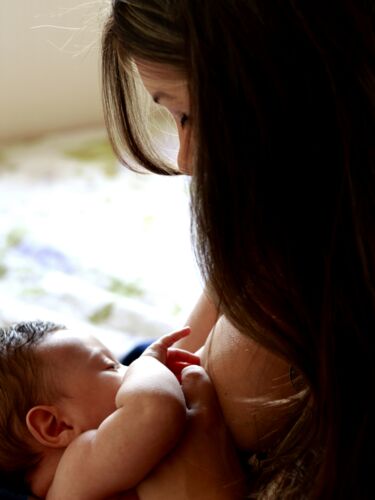Babies can become overweight
This is never an easy topic to broach, but it is, without doubt, the most worrying risk to the future health and happiness of your baby. The research evidence is absolutely clear:
- Eating, activity habits and food preferences start to develop early in life - in the first few days and weeks.
- Overweight and obesity impair normal childhood development.
- Overweight babies and toddlers are at least five times more likely to be overweight at the age of 12 than those who were a healthy weight in infancy.
- Childhood obesity tracks into adulthood - at least 70% of obese children, even those as young as 5 years, will go on to become obese adults.
- Obese children are at greater risk of serious long-term health problems, including heart problems, Type 2 diabetes and various cancers. We are now seeing conditions that were previously unheard of in children and teenagers such as Type 2 diabetes, early signs of fatty liver disease (the commonest cause of irreversible liver disease) and clogging of the arteries.
- The emotional consequences of obesity in childhood can be severe and long-lasting, including bullying, low self-esteem and social exclusiong.
- Rather than trying to manage children and teenagers who already have weight problems, we want to help you to prevent your baby becoming one of the 25% (1 in 4) who are overweight or obese when they start school.
Do's and don'ts to help prevent your baby becoming overweight or obese:
Do:
- Breastfeed
- Remember responsive feeding
- Understand your baby's feeding cues
- Only give your baby milk to drink
- Understand the growth charts
- Let us help with your efforts to prevent your baby becoming overweight
Don't:
- Give your baby more milk if they drain their bottle. When you finish your dinner it doesn't mean you want another one!
- Give your baby plenty of milk during the day hoping that they will sleep through the night sooner - they won't
- Start solids before six months
- Reward with sweets and treats
- Forget activity - this is a really important factor and the earlier you can get your baby active the better. However it is very difficult to control weight simply by increasing activity.
- Feel guilty if your baby becomes overweight - we know that the earlier it is spotted the better the chances of success in helping your baby return to a healthy weight
- Think we think this is easy! Being a parent is rarely straightforward but your are responsible for what your child is allowed to eat and drink - by you or other carers
Myths about weight:
'Obesity is inherited' - No it isn't. The obesity 'epidemic' has developed over the past 20 years but our genes haven't changed in that short time - they have generations to alter. Instead our lifestyles have altered and eating behaviour tends to run in families. Try to make your family healthier - it's worth it.
'Breastfed babies cannot becomes overweight' - Yes they can. It is much rarer but happens. The longer you breastfeed the lower the risk. Breastfeeding is only partly protective and the choices you make about starting solids, the portion sizes, the foods you offer and swapping to bottle feeding will all have an impact.
'My baby is always hungry' - No, they aren't. Many families describe this and are tempted to either give up breastfeeding, try milks for hungrier babies (which are unnecessary) or to introduce solids too early. Remember that babies cry for all sorts of reasons and it is important to recognise the difference between hunger cues and a baby who is crying about something else. Provided your baby is growing and gaining weight along their centiles they do not need any extra calories.
'My baby will slim down when they start exercising' - This is unlikely. Feeding habits start to develop in the first days and weeks of life. Not only are babies who are overweight at a year of age highly likely to be overweight when they start school, but they also have higher blood pressure. Yes - health differences even at a year!
'A big baby is a healthy baby' - Only if designed to be. We come in all shapes and sizes. It does not matter where your baby is on the growth charts provided they are not crossing the centiles up or down and their weight is within one major centile of their length. There is no 'best' centile. Encouraging your baby to cross the centiles upwards is rarely healthy even for a baby born small.
'We are a big-boned family' - Body Mass Index (BMI) allows for this. BMI is a simple index of weight-for-height that is commonly used in classifying overweight and obesity. A healthy BMI for adults is somewhere between 19-25, a range which allows for some people having a larger frame or being 'big-boned'. This is not a reason for having a higher than healthy BMI. In growing children, the healthy range varies with age and there are BMI charts for children over two. Your health visitor can show you these.



